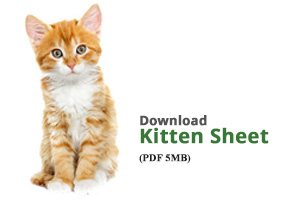
We just love puppies and kittens here at Kelperland! It is one of the best parts about working in a vet practice when young animals get brought into us for the first time – lots of cuddles and fuss are very much the order of the day!
It can be a daunting time when you collect your new pet and there is so much information out there it can all be a bit over whelming. So hopefully the following will help.
Puppies
Vaccinations
Most puppies require their vaccinations at 8 and 10 weeks old. Sometimes the timings vary slightly depending on which vaccine has been used and when but we will help you work all this out! Vaccines are vital to protect our puppies from fatal diseases. The vaccines we use are very safe and we have never encountered any problems with them. Vaccination is a whole topic in itself, for more info see here.
Microchipping
All puppies should now be microchipped by law at 8 weeks old, so the breeder should have done this for you and given you some paperwork to prove it. You now need to make sure the puppy is registered to your name and address.
Worming
Worming is required at 8, 10 and 12 weeks old. Then at 4, 5 and 6 months old. As your puppy grows up he/she will grow at an unpredictable rate so we recommend weighing them at each of these milestones (there is no extra cost for this, it provides a good opportunity to get them into the practice and get used to it, good chance for our staff to play with puppies too ;-)). Once your puppy is 6 months old he/she is classed as an adult and will need worming every three months thereafter.
Flea, Tick & Lungworm Treatments
Flea treatment is required once a month. Again, as the weight varies so will the dose so we will help you with this.
Tick and lungworm treatment is worthwhile depending on your pup’s lifestyle, will we discuss this with you when prescribing flea treatment (the products are combined).
We have very successful “Pet Club” here, if you sign your puppy into our club you get all your year’s vaccinations, flea and worm treatment cheaper over the course of the year, but also spread into little monthly payments, rather than occasional large payments. Find out more info and register your interest here.
Neutering
Neutering male dogs – he can be castrated from 6 months old in small dogs and from 12 months old in larger dogs (>20kgs). There are many pros and cons but in general if you know you are not going to breed from him then castration is a good idea – it prevents unwanted pregnancies, reduces overexcite-ability, can reduce aggression and reduces the risk of some cancers. The main con is that post castration some dogs put on excessive weight due to the hormonal changes that have occurred. This can be managed if you are aware of it though in our experience. A general anaesthetic is required, so we would have him in for a day procedure, he will go home that evening with a buster collar on his head to stop him licking his wound! We then check him a couple of times the following week.
Neutering female dogs – she can be speyed at 6 months old, or 2 months after a season has finished (to allow the hormones to settle). Again, if you are certain you do not want to breed from your bitch then we would recommend speying. It prevents unwanted pregnancies, nasty infections in later life, and reduces the risk of some cancers too. Again the main side effect is weight gain which needs to be closely monitored for a year post operatively. We perform the operation under general anaesthesia as a day procedure, so you would take her home that evening. In female dogs neutering is a more significant procedure as we have to go into her abdomen to remove her uterus. This means that strict rest is required for a couple of weeks afterwards whilst everything heals up. Again a buster collar will be needed and some pain killers, we will check her twice in the week after the op.
Nails
Lots of puppy owners worry about their puppy’s nails. Often they are very sharp but it is rare that they are too long and require trimming. The nail does have a blood supply which bleeds if cut through so caution is required. We are more than happy to examine his/her nails for you but are unlikely to trim them down for this reason. We find the best nail file is to walk them on pavements, which wears the sharp ends down nicely and painlessly.
Feeding
Most puppies would be on 3-4 meals a day initially, which comes down to 1 or 2 a day by 6 months old. Dry food is best for teeth. Treats should be kept to a minimum and used only if earned e.g. for obedience etc.
Toilet Training
Toilet training can be a messy business! Perseverance is the key! The first step is to have a puppy pad or old towel by the back door. When it looks as though he’s about to go to the toilet, lift him up and put him onto the pad, or take him outside. Every time he goes to the toilet outside give him praise, never punish him for going inside – he often won’t know what he’s done and this leads to anxiety. Some owners can get their pup to toilet on demand which is very useful! They do this by saying the same word each time they go so toileting is associated with this word.
Insurance
We recommend pet insurance. The capabilities of vets are now much higher but with this comes increased costs too. If you get an insurance policy set up whilst your puppy is young it will run and run in the background and you won’t think about it until the day it is needed. We find that owner’s stress levels are much less when their pet is ill if they have pet insurance, it means that there is one less thing to worry about. Occasionally pets in our care have very serious problems that can only be treated by a specialist, in these occasions the bill can easily get up to between £2-4,000, so insurance becomes extremely important! As with all insurance these days there is a large choice online! You need to sit down and consider very carefully what you need.
Unfortunately the cheaper policies are cheap for a reason and often come with a catch, you need to read the small print. We recommend ensuring that your policy limit per condition is £6,000 – this means you’re well covered if a specialist is required. Consider if you want a “lifelong” policy or not, this means that if your pet got an ongoing condition, e.g. diabetes, that needs lifelong treatment they would be covered forever. Lots of policies only cover for one year, which is fine for lots of things (e.g. a broken leg) but won’t be for other problems.
You need to do your research and find a policy that is right for you.
Kittens
Vaccinations
Kittens require vaccinations at 9 and 12 weeks old. Vaccines are vital to protect our kittens from fatal viral diseases. The vaccines we use are very safe and we have never encountered any problems with them. Vaccination is a whole topic in itself, for more info see here.
Microchipping
It is very sensible to microchip your kitten, so that if he/she gets lost you can be reunited. We often do this at their second vaccine or when they are under anaesthetic for neutering.
Worming
Worming is required at 8, 10 and 12 weeks old. Then at 4, 5 and 6 months old. As your kitten grows up he/she will grow at an unpredictable rate so we recommend weighing them at each of these milestones (there is no extra cost for this, it provides a good opportunity to get them into the practice and get used to it, good chance for our staff to play with them too!). Once your kitten is 6 months old he/she is classed as an adult and will need worming every three to six months thereafter.
Flea Treatment
Flea treatment is required once a month. Again, as the weight varies so will the dose so we will help you with this.
We have very successful “Pet Club” here, if you sign your kitten into our club you get all your year’s vaccinations, flea and worm treatment cheaper over the year, but also spread into little monthly payments, rather than occasional large payments. Find out more info and register your interest here.
Neutering
We highly recommend neutering your cat unless you are considering breeding. Neutered male cats are more placid, get into less fights with other cats and do less spraying in the house. Female cats are amazingly fertile and unwanted kittens are a real possibility unless you have her neutered.
Both sexes can be neutered from six months old. You leave them with us in the morning and collect them that evening. The procedure is performed under a general anaesthetic but is well tolerated and they recovery very quickly.
Letting Your Kitten Outside
There are no hard and fast rules about this but many people wait until their kitten has been neutered and has a microchip before letting them out. It is wise to go out with them for the first few weeks, do it just before feeding time so you can feed him/her when you back in, as a reward and also a reminder of where home is!
Nails
Lots of kittens have very sharp nails. Often there is not actually anything for us to be able to trim back but of course we’re always happy to have a look! The best bet is to get some cat scratching posts to encourage them to have some fun and file their nails back the same time.
Feeding
If your kitten is happy on dry food then it is best to keep him/her on dry food for ever. Although this never looks particularly appetising to us humans, a good dry, complete food gives your cat all he/she needs but crucially is so much better for her teeth than wet food in the long run. If he/she won’t eat dry on its own then we recommend using as little wet as possible mixed in to make it more palatable.
Insurance
We certainly recommend pet insurance. The capabilities of vets are now much higher but with this comes increased costs too. If you get an insurance policy set up whilst your kitten is young it will run and run in the background and you won’t think about it until the day it is needed. We find that owner’s stress levels are much less when their pet is ill if they have pet insurance, it means that there is one less thing to worry about. Occasionally pets in our care have very serious problems that can only be treated by a specialist, in these occasions the bill can easily get up to between £2-4,000 , so insurance becomes extremely important! As with all insurance these days there is a large choice online! You need to sit down and consider very carefully what you need.
Unfortunately the cheaper policies are cheap for a reason and often come with a catch, you need to read the small print. We recommend ensuring that your policy limit per condition is £6,000 – this means you’re well covered if a specialist is required. Consider if you want a “lifelong” policy or not, this means that if your pet got an ongoing condition, e.g. diabetes, that needs lifelong treatment they would be covered forever. Lots of policies only cover for one year, which is fine for lots of things (e.g. a broken leg) but won’t be for other problems.
You need to do your research and find a policy that is right for you.
If you’d prefer to download a copy of either info sheet, you may do so below:


